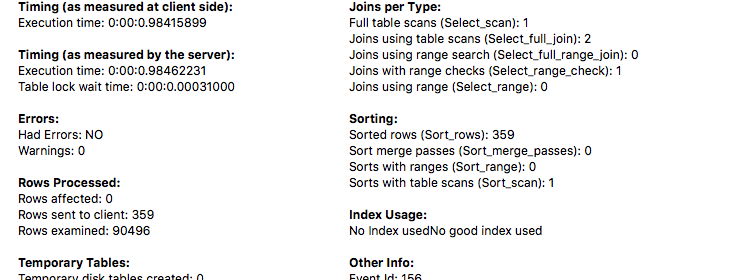The joins to utilizations and students are actually Inner Join as the WHERE-conditions will remove the NULLs created by the Outer Join.
The join to countries is really bad as it's using an ORed condition and joins three tables at the same time (optmizers choke on that).
Switch to Inner Joins whenever possible (MySQL's optimizer used to be bad in recognizing that an Outer Join is actually a Inner).
And try replacing the ORed join with UNION:
SELECT
res_rooms.room_id AS room,
res_rooms.type AS room_type,
res_rooms.status AS room_status,
IFNULL(utilizations.user_id, - 1) AS user_id,
CONCAT_WS(0, system_users.surname, camps.s_surname) AS surname,
CONCAT_WS(0, system_users.name, camps.s_first) AS name,
IFNULL(utilizations.start_date, NULL) AS start_date,
IFNULL(utilizations.end_date, NULL) AS end_date,
utilizations.keys_issued AS keys_issued,
utilizations.resource_type AS resource_type,
utilizations.staff_id AS staff_id,
CONCAT_WS(0, students.handled_by, camps.handled_by) AS handled_by,
CONCAT_WS(0,
students.date_of_birth,
camps.date_of_birth) AS dob,
CONCAT_WS(0, students.gender, camps.sex) AS gender,
CONCAT_WS(0, students.status, camps.status) AS status,
countries.common_name AS citizenship,
CONCAT_WS(0, students.applying_for, camps.applying) AS applying_for,
IFNULL(fee_schedule.ResiLife_type, 'N/A') AS residence_type,
IFNULL(fee_schedule.Resi_Amount, 'N/A') AS reslife_amount
FROM
res_rooms
JOIN
utilizations ON utilizations.resource_id = res_rooms.room_id
LEFT JOIN
system_users ON system_users.user_id = utilizations.user_id
LEFT JOIN
camps ON camps.camp_id = utilizations.user_id
JOIN
students ON students.user_id = utilizations.user_id
LEFT JOIN
countries ON students.citizenship = countries.code
LEFT JOIN
fee_schedule ON utilizations.user_id = fee_schedule.Stud_id
WHERE
(students.status = 'B'
OR students.status = 'VC')
AND utilizations.start_date <= CURDATE()
UNION
SELECT
res_rooms.room_id AS room,
res_rooms.type AS room_type,
res_rooms.status AS room_status,
IFNULL(utilizations.user_id, - 1) AS user_id,
CONCAT_WS(0, system_users.surname, camps.s_surname) AS surname,
CONCAT_WS(0, system_users.name, camps.s_first) AS name,
IFNULL(utilizations.start_date, NULL) AS start_date,
IFNULL(utilizations.end_date, NULL) AS end_date,
utilizations.keys_issued AS keys_issued,
utilizations.resource_type AS resource_type,
utilizations.staff_id AS staff_id,
CONCAT_WS(0, students.handled_by, camps.handled_by) AS handled_by,
CONCAT_WS(0,
students.date_of_birth,
camps.date_of_birth) AS dob,
CONCAT_WS(0, students.gender, camps.sex) AS gender,
CONCAT_WS(0, students.status, camps.status) AS status,
countries.common_name AS citizenship,
CONCAT_WS(0, students.applying_for, camps.applying) AS applying_for,
IFNULL(fee_schedule.ResiLife_type, 'N/A') AS residence_type,
IFNULL(fee_schedule.Resi_Amount, 'N/A') AS reslife_amount
FROM
res_rooms
JOIN
utilizations ON utilizations.resource_id = res_rooms.room_id
LEFT JOIN
system_users ON system_users.user_id = utilizations.user_id
LEFT JOIN
camps ON camps.camp_id = utilizations.user_id
JOIN
students ON students.user_id = utilizations.user_id
LEFT JOIN
countries ON camps.citizenship = countries.code
LEFT JOIN
fee_schedule ON utilizations.user_id = fee_schedule.Stud_id
WHERE
(students.status = 'B'
OR students.status = 'VC')
AND utilizations.start_date <= CURDATE()
ORDER BY room_id , start_date DESC
Or maybe better replace it by two joins to countries plus COALESCE:
SELECT
res_rooms.room_id AS room,
res_rooms.type AS room_type,
res_rooms.status AS room_status,
IFNULL(utilizations.user_id, - 1) AS user_id,
CONCAT_WS(0, system_users.surname, camps.s_surname) AS surname,
CONCAT_WS(0, system_users.name, camps.s_first) AS name,
IFNULL(utilizations.start_date, NULL) AS start_date,
IFNULL(utilizations.end_date, NULL) AS end_date,
utilizations.keys_issued AS keys_issued,
utilizations.resource_type AS resource_type,
utilizations.staff_id AS staff_id,
CONCAT_WS(0, students.handled_by, camps.handled_by) AS handled_by,
CONCAT_WS(0,
students.date_of_birth,
camps.date_of_birth) AS dob,
CONCAT_WS(0, students.gender, camps.sex) AS gender,
CONCAT_WS(0, students.status, camps.status) AS status,
COALESCE(c1.common_name, c2.common_name) AS citizenship,
CONCAT_WS(0, students.applying_for, camps.applying) AS applying_for,
IFNULL(fee_schedule.ResiLife_type, 'N/A') AS residence_type,
IFNULL(fee_schedule.Resi_Amount, 'N/A') AS reslife_amount
FROM
res_rooms
JOIN
utilizations ON utilizations.resource_id = res_rooms.room_id
LEFT JOIN
system_users ON system_users.user_id = utilizations.user_id
LEFT JOIN
camps ON camps.camp_id = utilizations.user_id
JOIN
students ON students.user_id = utilizations.user_id
LEFT JOIN
countries AS c1 ON students.citizenship = c1.code
LEFT JOIN
countries AS c2 ON camps.citizenship = c2.code
LEFT JOIN
fee_schedule ON utilizations.user_id = fee_schedule.Stud_id
WHERE
(students.status = 'B'
OR students.status = 'VC')
AND utilizations.start_date <= CURDATE()
ORDER BY room_id , start_date DESC



LEFT JOINs actually return anINNER JOINresult due to the WHERE-conditions. And anORed join is usually quite bad. Try repalcing it by ´UNIONing two Selects (copy the Select and use one of the join conditions tocountries`.EXPLAINfor how to do this).SHOW CREATE TABLE; sounds like the indexes or datatypes are 'bad'.